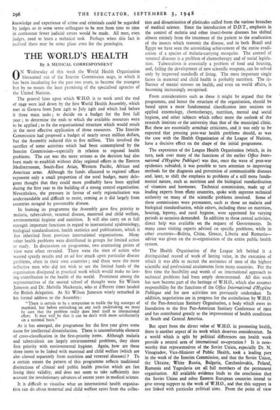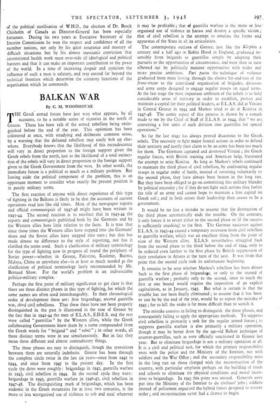THE WORLD'S HEALTH
By A MEDICAL CORRESPONDENT
ON Wednesday of this week the World Health Organisation blossomed out of the Interim Commission stage, in which it has been incubating for the past two years, to become the youngest but by no means the least promising of the specialised agencies of the United Nations. 4
The general lines upon which W.H.O. is to work until the end of 1949 were laid down by the first World Health Assembly, which met in Geneva from June 24th to July 24th and which had before it three main tasks ; to decide on a budget for the first full year ; to determine the ends to which the available resources were to be applied ; to fix the organisational structure which would result in the most effective application of those resources. The Interim Commission had proposed a budget of nearly seven million dollars, but the Assembly reduced this to five million. This involved the sacrifice of some activities which had been contemplated by the Interim Commission—especially in relation to regional health problems. The cut was the more serious as the decision had also been made to establish without delay regional offices in the Eastern Mediterranean, South-East Asian, Western Pacific, African and American areas. Although the funds• allocated to regional offices represent only a small proportion of the total budget, many dele- gates thought that they could more profitably have been applied during the first year to the building of a strong central organisation. Nevertheless, the pressure in favour of early regionalisation was understandable and difficult to resist, coming as it did largely from countries ravaged by preventable disease.
In framing its programme the Assembly gave first priority to malaria, tuberculosis, venereal disease, maternal and child welfare, environmental hygiene and nutrition. It will also carry on at full strength important functions in regard to international epidemiology, biological standardisation, health statistics and publications, which it has inherited from previous international organisations. Many other health problems were distributed in groups for limited action or study. In discussions on programme, two contrasting points of view were often revealed. There were the men of action who
wanted speedy results and an ad hoc attack upon particular disease problems, often in their own countries ; and there were the more reflective men who did not wish to see the limited funds of the organisation dissipated in practical work which would make no last- ing contribution to the health of the world. Prominent among the representatives of the second school of thought were Sir Wilson Jameson and D. Melville Mackenzie, who at d:fferent times headed the British delegation. As Sir Wilson Jameson wisely remarked in his formal address to the Assembly : "There is certain to be a temptation to tackle the big scourges of mankind, but before embarking on any such undertaking we must be sure that the problem really does lend itself to international effort. It may well be that it can be dealt with more satisfactorily on a national basis."
As it has emerged, the programme for the first year gives some cause for intellectual dissatisfaction. There is uncomfortable element of cross-classification in the first-priority items. Although malaria
and tuberculosis are largely environmental problems, they share first priority with environmental hygiene. Again, how are these three items to be linked with maternal and child welfare (which are also classed separately from nutrition and venereal diseases) ? To
a certain extent the pattern of this programme reflects traditional
distinctions of clinical and public health practice which are fast losing their validity, and does not seem to take sufficiently into account the revolutionary advances of recent years in medical science.
It is difficult to visualise what an international health organisa- tion can do about maternal and child welfare apart from the collec- tion and dissemination of platitudes culled from the various branches of medical science. Since the introduction of DDT., emphasis in the control of malaria and other insect-borne diseases has shifted almost entirely from the treatment of the patient to the eradication of the insects which transmit the disease, and in both Brazil and Egypt we have seen the astonishing achievement of the entire eradi- cation of a species of malaria-carrying mosquito. The control of venereal diseases is a problem of chemotherapy and of social legisla- tion. Tuberculosis is essentially a problem of food and housing, and, failing the development of new scientific weapons, can be solved only by improved standaras of living. The most important single factor in maternal and child health is probably nutrition. The in- fluence of mental stresses on health, and even on world affairs, is becoming increasingly recognised.
From considerations such as these it might be argued that the programme, and hence the structure of the organisation, should be based upon a more fundamental classification into sections on applied entomology, chemotherapy, nutrition, mental and social hygiene, and other subjects which reflect more the outlook of the research institute or the university than that of the municipal clinic. But these are essentially armchair criticisms, and.it was only to be expected that pressing post-war health problems should, as was the case with the Health Organisation of the League of Nations, have a decisive effect on the shape of the initial programme.
The experience of the League Health Organisation (which, in its turn, took over many of the functions of the earlier Office Inter- national d'Hygiene Publique) was that, once the wave of post-war epidemics subsided, it was possible to turn attention to improving methods for the diagnosis and prevention of communicable diseases and, later, to shift the emphasis to problems of a still more funda- mental nature, such as nutrition and the biological standardisation • of vitamins and hormones. Technical commissions, made up of leading experts from niany countries, spoke with supreme technical authority on many of the scientific problems involved. Some of these commissions were permanent, such as those on malaria and biological standardisation, while others, including those on nutrition, housing, leprosy, and rural hygiene, were appointed for varying periods as occasion demanded. In addition to these central activities, direct help was available on the request of Governments. In many cases visiting experts' advised on specific problems; while in other countries—Bolivia, China, Greece, Liberia and Rumania— advice was given on the re-organisation of the entire public health system.
The Health Organisation of the League left behind it a distinguished record of work of lasting value, in the execution of which it was able to recruit the assistance of men of the highest scientific and professional attainments from many countries. For the first time the feasibility and worth of an international approach to technical problems had been amply demonstrated. All this work has now become part of the heritage of W.H.O., which also assumes responsibility for the functions of the Office International d'Hygiene Publique and for new activities not previously undertaken. In addition, negotiations are in progress for the assimilation by W.H.O. of the Pan-American Sanitary Organisation, a body which owes its foundation to the first Pan-American Sanitary Conference of 1902 and has contributed greatly to the improvement of health conditions in South and Central America.
But apart from the direct value of W.H.O. in promoting health, there is another aspect of its work which deserves consideration. In a world which is split by political differences can health work provide a neutral area of international co-operation ? It is note- worthy that representatives of the Soviet Union, especially Dr. N. Vinogradov, Vice-Minister of Public Health, took a leading part in the work of the Interim Commission, and that the Soviet Union, the Ukraine; White Russia, Bulgaria, Czechoslovakia, Poland, Rumania and Yugoslavia are all full members of the permanent organisation. All available evidence leads to the conclusion that the Soviet Union and other Eastern European countries intend to give strong support to the work of W.H.O., and that this support is not linked with particular political aims. From the point of view
of the political sterilisation of W.H.O., the election of Dr. Brock Chisholm of Canada as Director-General has been especially fortunate. During his two years as Executive Secretary of the Interim Commission he won the respect and confidence of all the member nations, not only by his quiet assurance and mastery of difficult situations but by his almost messianic conviction that international health work must over-ride all ideological and political barriers and that it can make an important contribution to the peace of the world. In a time of increasing despair and cynicism • the influence of such a man is salutary, and may extend far beyond the technical frontiers which determine the statutory functions of the organisation which he commands.



































 Previous page
Previous page